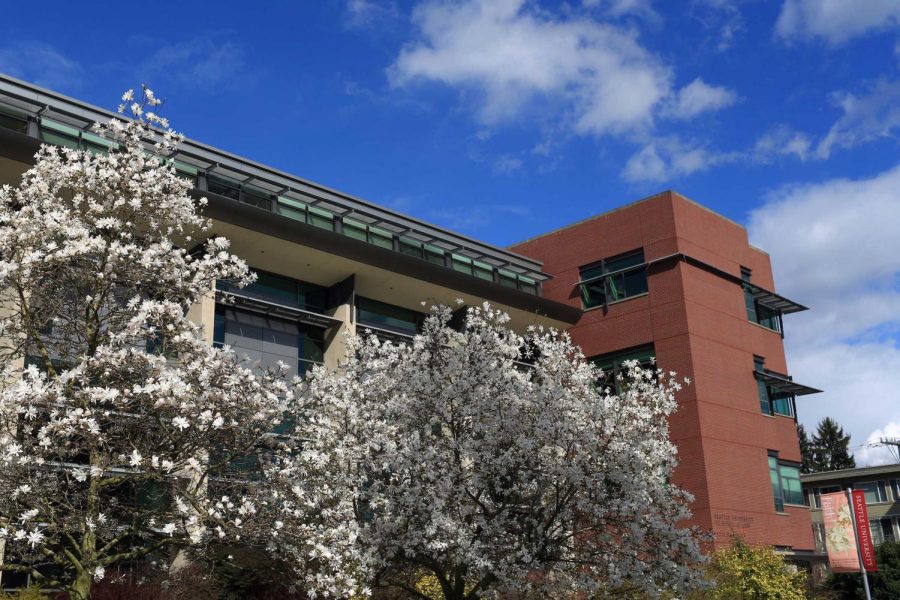To encourage and support student-driven, independent research, the Lemieux Library is offering a new pool of undergraduate research funding opportunities. Open to undergraduate students from all disciplines, awarded funds go toward those interested in conducting either small or large-scale research as well as conference travel for students giving presentations at conventions.
Though there are a plethora of resources and services on campus, students tend to get caught up in the turbulence of their schedules which may cause them to have difficulty utilizing what is readily available. Acknowledging potential drawbacks, Director of Marketing Student Engagement Jacob Smithers hopes that other commitments don’t deter students from taking advantage of funding opportunities.
“A college degree is a substantial investment, so anything to help them out or add value to their time at Seattle University is a big win,” Smithers said. “I know students are busy with their day-to-day lives, but taking advantage of all the resources and services on campus, like these Undergraduate Research and Travel Awards, will not only help them succeed but will help them stand out after graduation.”
One source of research funding is the Dean’s Research Award, a fellowship for those in the College of Arts and Sciences that provides a stipend for students and faculty to put toward conducting summer research. Additionally, students who are given the opportunity to participate in funded research will not only receive financial support, but guidance from faculty who will serve as mentors to the student throughout their project.
Yen Tran, who works as a scholarly services librarian, discussed the role that the Dean’s Research Award can play in granting students research opportunities that may have previously felt out of reach due to a lack of resources.
“The Dean’s Research Award can be helpful in encouraging greater student research participation because students can use the award money to purchase materials, equipment, software, or incentives that they need to be able to begin and complete their project,” Tran said. “This could help to alleviate some of their financial pressures.”
In consideration of associated costs with other educational opportunities, for those accepted to present at a professional or scholarly event, the Conference Travel Award helps reduce both the costs and anxieties associated with travel. Highlighting its potential impact, Tran also noted how this award can play into the academic development of students.
“For some academic conferences, registration alone can be $1,000; with airfare or driving costs, lodging, meals and other expenses at the conference, undergraduate students may be deterred,” Tran said. “The Conference Travel Award provides students with funds to cover all or most of their conference travel expenses, leaving them with the headspace to share their work with others, spark new ideas or research areas and consider their futures as professionals in that field.”
Regardless of one’s discipline and area of interest, both awards can serve as opportunities for students to develop as an emerging professional in their field and potentially shape their future endeavors.
Funding for undergraduate research is not taken out of students’ paid tuition. Instead it is money from the Lemieux Library’s operating budget, which comes from alumni donations and contributions from other outside bodies.
Sarah Barbara Watstein, dean of the Lemieux Library and McGoldrick Learning Commons, highlighted the crucial role that libraries can play in student development, helping bolster students’ ability to develop skills and interest surrounding their academic career.
“The Lemieux Library supports students’ quest for knowledge––providing them with information, resources, and services,” Watstein said. “Today’s information landscape is always changing, which can be challenging to navigate. This makes library professionals a critical partner for students’ academic pursuits.”
Another way that the Lemieux Library and its librarians intend to support the academic growth of its students is through the Seattle U Student Research and Creativity Conference (SRCCon) which will be held May 10. While being an opportunity for students to showcase either their research or creative pieces they’ve been working on, it could now be utilized as a platform for those passionate in their research interests to vie for the new funding opportunities.
For many students, college is a financial burden in and of itself. To try and self-fund research in addition to paying tuition presents itself as an unlikely possibility. On-campus platforms, however, have risen to try and break down financial barriers to academic exploration.
In obtaining fiscal support, students can work to pursue academic inquiries without fear of running out of money, or not having enough to start with.








